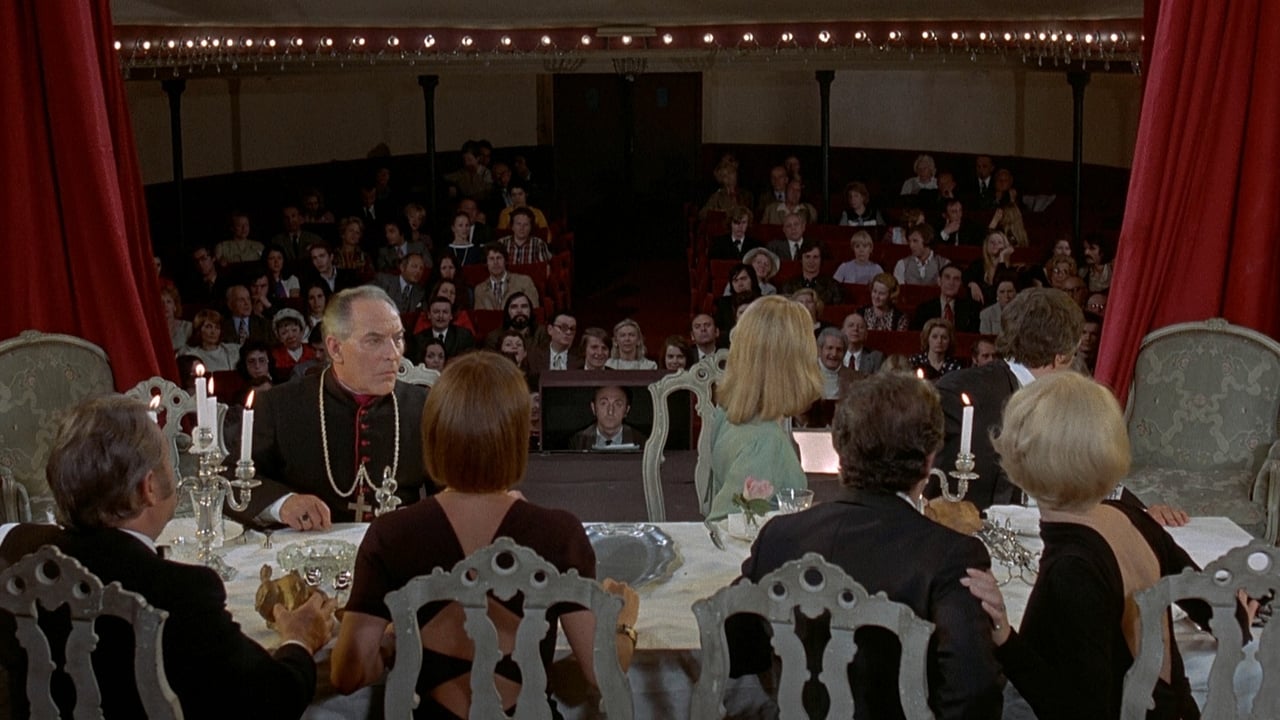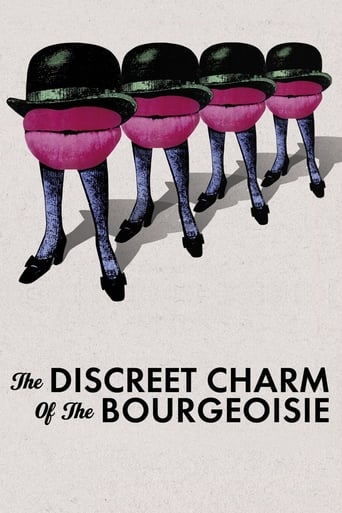

"The Discreet Charm of the Bourgeoisie", without question is my most favorite movie of all time. There really has never been a movie until this one, that I would consider flawless. I normally find flaws, and I bet there is a few in there, but whatever they were, it didn't bug me at all. People might not like this film, because it makes you think for yourself, it makes you question what just happened, and it is just crazy bizarre in every way.Luis Buñuel is incredible. I never thought after watching one film from a specific director, that I would find my favorite director. His shots in this film are very unique. He uses a different style than the way most do. If I'm not mistaken I think at most he uses two cameras for this film. But most of his shots work with panning, so he is incredible with manipulating the camera to get everything he needs almost in one shot on one camera. If you have not heard of this film, or you just overlooked this film, rethink and see this movie.The first time I have ever given a *10* rating, and might be the only time.
... View MoreA surreal, virtually plot less series of dreams centered around six middle-class people and their consistently interrupted attempts to have a meal together.The analysis of this film seems to be about drawing parallels to Sartre's "No Exit" and the Greek myth of Tantalus. I see the latter, while the former sounds like a stretch. The most obvious analysis appears to me to be what the film is on the face of it: a scathing look at the rich.Buñuel later said that he was disappointed with the analysis that most film critics made of the film. He also disliked the film's promotional poster, depicting a pair of lips with legs and a derby hat. Which analyses he disliked I do not know, and what message we all missed is unclear.My biggest disappointment was how strange the film was not, especially after such classic works like "Un Chien Andalou". While essentially plot less, this film is still quite linear and sensical in its own way. I could have used more oddity.
... View MoreI'm just experiencing Bunuel for the first time. I am captivated. Having seen the darker Exterminating Angel first, I had a sense of what he is about. This is another surreal effort that puts upper class people in a situation where they seem to have free will, yet are at the whim of some outside force. Of course, there is always the possibility that the problems lie in their minds. Is it Freudian or Jungian or what? In this a group of wealthy people attempt to eat several meals and are cut off at the pass by several forces, not allowing a conclusion. They are also interesting characters. The women are snobbish and sensual, cold and calculating; one is a drunk. The men are involved in illegal activities and seem to pay a great price. Or do they? That's the issue. They seem to be saddled with guilt. Every so often, a non-sequitir comes along, stops whatever plot has developed, and another dinner is served. A young lieutenant tells the tale of a double murder of his parents and his vengeance. Soldiers appear at dinner. Police arrest them. They are unscathed. I can not tell you any more about what this means because I'm not even sure Bunuel can. It is a striking piece of work, full of humor, disease, and class warfare. Interesting.
... View MoreSix upper middle class jerks attempt to meet for dinner on a number of occasions and find themselves caught up in many a farce. In "The Discrete Charm of the Bourgeoisie", the everyday becomes entangled with dream at every turn. The reality of the drug running foreign ambassador comes into direct conflict with the guerrilla forces his domestic policies engender, the gardener monseigneur of the church ends up taking confession from his parents' murderer while the culprit is on his deathbed, the cocktail party hosted by a general breaks down into a small battle in his dining room, a sexually frustrated couple are forced to elude their company and couple out in the garden, an afternoon luncheon is turned into an audit of fratricidal confession from a young army lieutenant. At every crossroads, the pretentious "civility" of professional society finds itself disrupted by the casual violence and mayhem that underscores their class privilege. Bunuel's use of the nightmare tells the audience what the bourgeoisie knows very well: they know what a bunch of casual gangsters they actually are, and sleep will not let them hide from themselves. And none of the charm of the bourgeoisie will be enough to break them away from their ongoing isolation from themselves and nature, expressed very cleanly by Bunuel's repeated image of the six professionals, in semi-formal dress, walking down a country road in the middle of nowhere. And it's all very funny, in an unfunny sort of way.Bunuel's masterpiece holds up well, almost forty years after its release. Here's a farce that demonstrates just how far a "satirist" like Sasha Baron Cohen ("Borat") really has to go before he has anything substantial to say with farce or film.
... View More